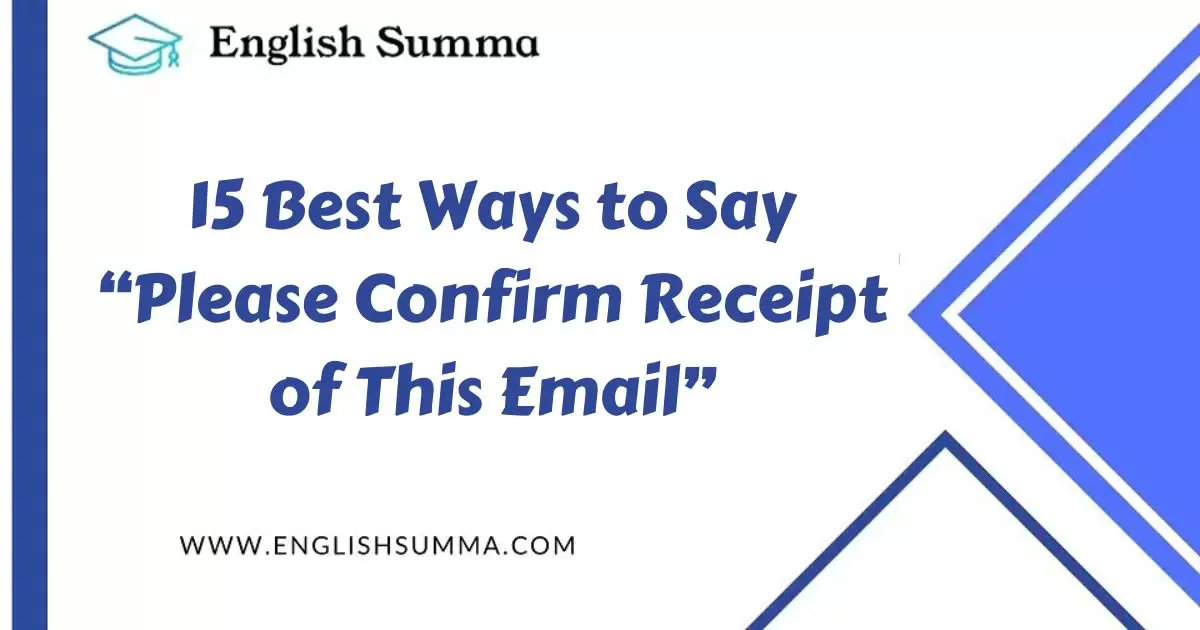In the dynamic realm of professional communication, ensuring that your messages are not only received but also acknowledged is crucial. One common request is to seek confirmation of email receipt.
However, employing various professional and polite synonyms in your queries can add a touch of refinement to your correspondence.
Let’s delve into fifteen distinctive ways to convey the same message effectively.
1. Kindly Acknowledge Receipt of this Email
In a formal business setting, a courteous tone can enhance communication. For instance:
Dear Mr. Smith,
I trust this email finds you well. I would like to bring your attention to the recent document I sent your way. Could you kindly acknowledge receipt at your earliest convenience? Your prompt response is highly appreciated.
Best regards,
James Wilson
Expressing gratitude creates a positive tone, making it more likely to receive a prompt response.
2. Please Confirm that You Have Received this Message
Direct and to the point, this phrase ensures clarity. For example:
Dear Ms. Johnson,
I hope this email reaches you without any issues. Could you please confirm that you have received this message? Your confirmation is important for our records.
Thank you,
James Wilson
Specify the importance of their confirmation for added urgency.
3. I Would Appreciate it if You Could Confirm Receipt of this Email
Expressing appreciation adds a touch of warmth to your request. Consider:
Dear Mr. Smith,
I appreciate your attention to this matter. Could you please take a moment to confirm receipt of this email? Your cooperation is valued.
Best regards,
James Wilson
Using polite language adds sincerity to your request.
4. Could You Please Let Me Know When You Receive this Email?
Including a timeframe adds specificity to your request. For instance:
Hello Mr. Smith,
I trust this email finds you well. When you have a moment, could you let me know when you receive this email? Timely confirmation is greatly appreciated.
Kind regards,
Justin Taylor
Specify a time frame only if necessary, avoiding unnecessary pressure.
5. Your Confirmation of Receiving this Email Would Be Greatly Appreciated
Using words like “greatly appreciated” adds a polite touch. For example:
Dear Mr. Smith,
I hope this email reaches you in good spirits. Your confirmation of receiving this email would be greatly appreciated. Thank you for your prompt attention.
Best regards,
James Wilson
Expressing gratitude creates a positive tone, making it more likely to receive a prompt response.
6. I’m Seeking Confirmation that You’ve Received this Email
Adding a personal touch to your request can make it more engaging. Consider:
Dear Mr. Smith,
I trust you are well. I’m reaching out to seek confirmation that you’ve received this email. Your prompt response is anticipated.
Thank you,
James Wilson
Expressing your purpose in a straightforward manner adds clarity.
Also, don’t miss out to learn about 15 Professional Ways to Express “It Was a Pleasure Meeting You”
7. Can You Please Confirm that You Have Received the Email?
A straightforward question can be effective. For instance:
Hello Mr. Smith,
I hope this message finds you in good health. Could you confirm that you have received the email I sent earlier? Your acknowledgment is important.
Best regards,
James Wilson
Keeping it simple can enhance the chances of a quick response.
8. I Kindly Request You to Confirm the Receipt of this Email
Formal language can be particularly appropriate in professional settings. For example:
Dear Mr. Smith,
I trust this email finds you well. I would like to kindly request you to confirm the receipt of this email. Your cooperation is highly valued.
Sincerely,
James Wilson
Using formal language adds a professional touch to your communication.
9. It Would Be Helpful if You Could Acknowledge that You’ve Received this Email
Conveying the request as a favor can make it more appealing. Consider:
Dear Mr. Smith,
I hope this email reaches you without any issues. It would be helpful if you could acknowledge that you’ve received this email. Thank you for your attention to this matter.
Best regards,
James Wilson
Framing the confirmation as a favor can create a positive tone.
10. May I Ask for Your Confirmation Regarding the Receipt of this Message?
Adding a touch of formality to your request can be effective. For instance:
Hello Mr. Smith,
I trust you are well. May I ask for your confirmation regarding the receipt of this message? Your prompt response is appreciated.
Kind regards,
James Wilson
Using a formal structure can add a touch of professionalism to your communication.
11. Please Let Me Know Once You’ve Received this Email
A direct request with a touch of informality can be effective. For example:
Dear Mr. Smith,
I trust this email finds you well. Could you please let me know once you’ve received this email? Your confirmation is important for our records.
Thank you,
James Wilson
A casual tone can be appropriate depending on the relationship with the recipient.
12. Your Acknowledgment of Receiving this Email is Requested
Clearly stating the purpose of your request can enhance clarity. Consider:
Dear Mr. Smith,
I hope this message finds you in good spirits. Your acknowledgment of receiving this email is requested. Thank you for your prompt attention.
Best regards,
James Wilson
Using language that emphasizes the importance of their acknowledgment.
13. I’d Appreciate it if You Could Confirm the Successful Delivery of this Email
Acknowledging the successful delivery can add a positive spin to your request. For example:
Hello Mr. Smith,
I trust this email finds you well. I would appreciate it if you could confirm the successful delivery of this email. Your prompt response is valued.
Sincerely,
James Wilson
Focusing on the successful delivery emphasizes the completion of the process.
14. Could You Please Verify that You Have Received this Email?
Using terms like “verify” adds a level of formality and importance. Consider:
Dear Mr. Smith,
I hope this email reaches you without any issues. Could you please verify that you have received this email? Your cooperation is appreciated.
Kind regards,
James Wilson
Using strong terms like “verify” can add a sense of urgency.
15. I’m Looking for Confirmation that this Email has been Received on Your End
Providing clarity about where the confirmation is needed can be beneficial. For instance:
Dear Mr. Smith,
I trust this email finds you well. I’m looking for confirmation that this email has been received on your end. Your prompt response is anticipated.
Best regards,
James Wilson
Being specific about the location of the confirmation can avoid any potential confusion.
Final Thoughts
In conclusion, while the core message remains the same, the choice of words and expressions can significantly impact the effectiveness of your request for confirmation of email receipt. Experimenting with these diverse phrases allows you to tailor your communication to different professional scenarios, fostering clarity and efficiency in your exchanges.

Meet Steven Smith, the driving force behind “English Summa.” Armed with a Bachelor’s Degree in Linguistics and a passion for teaching, Steven is dedicated to unraveling language intricacies for eager minds. Join him on a journey of linguistic discovery through Language Odyssey—a space where education meets inspiration, and the beauty of language unfolds.

